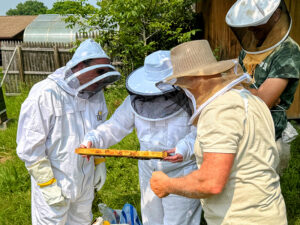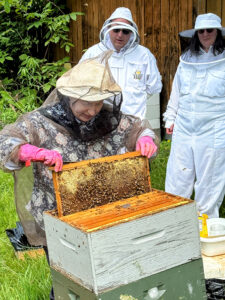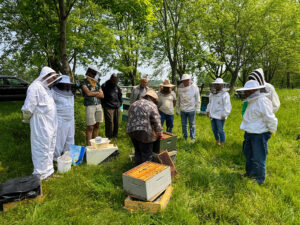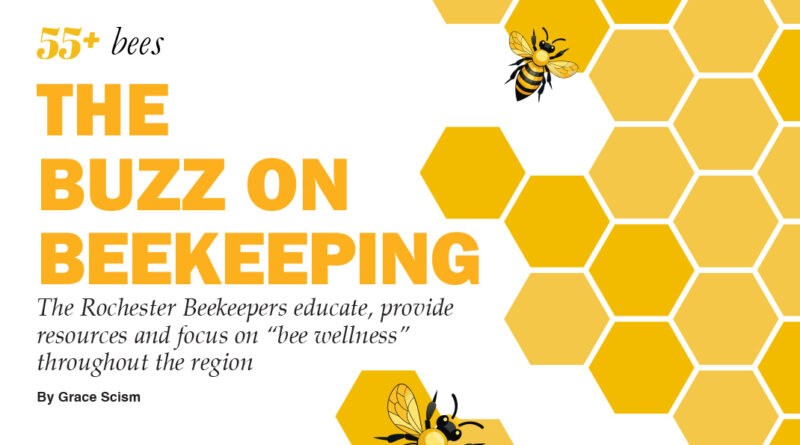The Buzz on Beekeeping
The Rochester Beekeepers educate, provide resources and focus on “bee wellness” throughout the region
By Grace Scism

Bee season is upon us and the Rochester Beekeepers are ready.
While many home and business owners may not welcome a swarm of bees on their property, Rochester Beekeepers welcome the opportunity to help these bee colonies find a new home.
Pat Bono formed Rochester Beekeepers about 14 years ago to help beekeepers stay connected and educate themselves on the art and science of beekeeping. The first meetings were held in a pizza parlor — then at the old Monroe Cornell Cooperative Extension on Highland Avenue — and now at Hansen Nature Center in Henrietta’s Tinker Nature Park, where they have a teaching hive in their apiary.
Bono has been beekeeping for nearly 50 years and has been maintaining her apiary and honey harvest at an antique barn and land outside of Pultneyville for the past 16 years.
A graduate of the University of Montana’s online beekeeping certificate program, Bono now sells her honey at Whole Foods Market, Lori’s Natural Foods, Leo’s Bakery and Taste NY stores, in addition to private sales and events.
Bono’s company, Seaway Trail Honey, was judged the best tasting honey in the eastern U.S. by the Eastern Apicultural Society. She said honey produced at her apiary was even served at the 2013 Presidential Inaugural Luncheon in Washington, DC.
In addition to facilitating the Rochester Beekeepers group, Bono maintains the website RochesterBeekeepers.com, which offers an extensive resource page for beekeepers, as well as a list of “swarm catchers” by region.

“Honey bee swarms form when a bee colony sends out a queen and bees to find a new home,” Bono said. “This is their way of creating a new colony.” The bees will alight on a branch or other place for only a few hours or days. They then leave to a more sheltered permanent place, such as a hollow tree, abandoned building or house soffit, for example.
Beekeepers are desperately seeking honey bees to replace bees that may have died during the last cold winter. Swarm catchers are prepared to collect or remove swarms free of charge. However, this does not include ground bees or wasps. RochesterBeekeepers.com has information on how to differentiate between wasp nests and honey bee swarms or colonies.
Bono also shares her beekeeping expertise through NY Bee Wellness, an educational nonprofit 501(c)(3) organization that sends bi-annual surveys to a wide range of beekeepers, bee clubs, agriculture and horticulture experts, and extension offices to gauge bee health across New York state.
“Our most recent survey showed a 38% non migratory bee loss statewide,” said Bono. She attributes the higher-than-average loss to a harsher winter. Last year’s milder winter resulted in a 19% loss. Bono has been conducting the survey for 12 years.
NY Bee Wellness has a monthly mailing that goes out to about 450 beekeepers, offers a beginning beekeeping class in the winter, and holds workshops on a variety of topics affecting the health of the honey bee, including how to recognize diseases.
At the June meeting of Rochester Beekeepers, participants learned how to diagnose varroa mite levels. “The varroa mite is an invasive parasite that transmits viruses to honeybees and is the main cause of colony loss,” said Bono.

Participants watched as she put powdered sugar and bees in a jar, shook it and then dumped it on a paper plate. Fortunately, no mites were left on the plate, however Bono explained that mites and viruses are more likely to be detected later in summer.
Bill Roode is one of the veteran beekeepers that attends Rochester Beekeeper meetings, held throughout the year. A Massachusetts resident at the time, he and his 5-year-old son decided to take a three-month course on beekeeping for three-hours a week at the Norfolk County Agricultural School.
“At the end of the course, you got your bees,” said Roode. “My son became the youngest beekeeper in Norfolk County.”
Roode took his beekeeping expertise to Webster when he and his wife moved to be closer to their children and grandchildren. And now his hobby has become both a family and neighborhood affair.
“So we call all the kids together, grandkids, neighbors, everybody else we can find, and we have a honey extracting party in our garage,” said Roode. “It’s a regular family affair — somebody’s cranking the honey, somebody’s bottling it, somebody’s putting the labels on it. So in three or four hours, we have 180 bottles of honey. About 100 pounds of honey — that’s a good year.”
Dennis Prieto said it was his wife, Norma, who sparked his interest in beekeeping.
“My wife is the beekeeper and I assist,” he said. “We always liked bees and appreciate them, so my wife started reading, watching videos, educating herself, and then signed me up for the class with Pat.”
The couple bought their first bees in April of last year. “Now it’s more hands on. I’m connecting the dots of what I already learned versus what I actually have to do,” said Prieto, a Hilton resident.
In addition to their two hives, the Prieto’s now have a swarm as well. The June Rochester Beekeepers meeting gave Prieto the opportunity to learn how to collect the swarm.
“We haven’t really planned on selling or doing a business out of the bees,” said Prieto. “It’s mostly to bless our friends and family.”
Roode said he has always been fascinated with what is really a miraculous process — from the 16 days it takes for a queen cell to mature to the 2,000 eggs that a new queen will lay in a day to the perfect little hexagons within each honeycomb.
“People think bees are just a nuisance, but they’re actually pretty peaceful,” said Roode. “And without bees, our food supply would be cut in half. I think people underestimate that.”
More About Local Honey
To learn more about beekeeping, visit RochesterBeekeepers.com or NYBeeWellness.org. For Bono’s award-winning honey, visit NYHoneyBuzz.com.

